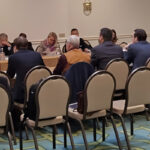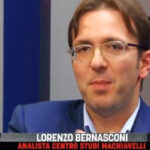On Friday, February 11, Draghi's Italy finally said goodbye to the mandatory wearing of masks outdoors. Mandatory that, let's be clear, has not suddenly become unreasonable because of a real or alleged decrease in contagions (moreover, the tracking has been gone out for months and how much the real contagions amount today no one can know), but it was absurd and disproportionate ab origine (except for street demonstrations, major events and some very crowded streets in the historic centers of major cities).
What the outdoor mask was really for
The requirement to wear a mask while walking through half-empty streets has always had very little to do with public health and a lot to do with politics and psychology: the imposition of an afflictive and clearly senseless practice allows us to understand many things about the nature of a people, as well as conditioning the moods and orientations.
First of all, it has allowed to evaluate - at a glance - the rate of uncritical obedience to the dictates, however unreasonable, of authority: a rate that in Italy has proved to be decidedly high. Secondly, it has forced "dissidents" to choose between adapting and submitting or coming out, making themselves immediately visible and recognizable in the eyes of power and its delegates, but also of colleagues or neighbors. Finally, it has created a profound social fracture, transforming, in the eyes of the majority of Italians, a peaceful citizen who walks his dog in a semi-deserted park - without wearing a mask - into a terrorist who threatens public health.
In all this, of course, has played a key role the constant drumbeat of the media, which for two years now are competing in trying to convince us that there is an apocalypse outside the house and that we must rely entirely on the promises of the government and Big Pharma to save us.
Nostalgics of the mask
To think, today, that the aforementioned fracture will be recomposed immediately and without scars thanks to the government's reversal, which has finally abolished the requirement to wear a mask outdoors, would be decidedly naive. The so-called "new normality", imposed for months to the sound of decrees, is in fact imprinted in the psychology of people: proof of this are the peana of Caterina Soffici on "La Stampa" or of the everlasting Massimo Gramellini - unparalleled in packing atrocious banalities with so much art as to be able to pass them off as maxims of wisdom - on "Corriere".
The two champions of political correctness, in fact, shed tears in memory of the defunct obligation to walk around with a muzzle, of which "we already feel a little nostalgic", because "the mask will be missed" and "many will continue to wear it anyway". After all, it must be said, both recognize, at least implicitly, that the mask was useless outdoors, it was a Linus' blanket good only to make people feel safer. Wearing it even in total solitude is nothing more than an apotropaic gesture to ward off the terror of contagion and death, a way to convince oneself that you are safe, to feel like a good citizen, to delude oneself that the situation is under control.
The fragile individual
As Gramellini himself admits, "luckily there is a carnival coming up, which will provide an excellent alibi for putting it back on and avoiding dressing up as oneself", that is, avoiding exposing oneself to the world and its dangers as an individual, laying bare one's individuality, because we know that the world is big and the forces that determine its course are immense, while the individual is, by comparison, always fragile and defenseless.
However, if man has always perceived himself as a social animal, it must also be said that his way of relating to his fellows is quite different from that of the ant or the bee. The human being, as intuited by the founder of psychoanalysis Sigmund Freud in his Civilization and its discontents, has an innate need to act on the world by manifesting its individuality: therefore, the drive to homologation imposed by society causes in the individual psychic suffering all the greater the more repressive and homologating a given social context is.
To survive or to live?
For decades now, the West has stopped asking itself about the fundamental problems of philosophical anthropology: who man is, what his place in the cosmos is, what he needs. However, only from a clear vision of the human being and his relationship with the world is it possible to imagine a model of society that is at the service of man, rather than making man a servant.
The nature of the dilemmas we have to face is not scientific or technical, but ethical: it is necessary, for example, to decide whether the mere continuation of basic vital functions for the longest possible time and for the greatest possible number of people is really the ultimate goal to which a society should aim, or whether instead, as Rita Levi Montalcini claimed, it is more important to add life to years rather than years to life.
Personally, I think we need a strong and cohesive stance by all those who, in the world of culture, refer to libertarian ideas, even before the liberal ones: it is time to say that life should be lived to the full, even if it involves risks, which have always been an inevitable component. We must reaffirm that, more than death (inescapable corollary of all life), we must fear the non-life that we have sadly experienced in these two years, and that in the space between "survive" and "live" are all those dimensions that characterize us as fully human beings.
Post scriptum
In the past few weeks, on the streets of Rome, I have noticed that almost all foreigners were walking around without masks, while the natives seemed to be almost all obedient to what the government had established. This undoubtedly can tell us something about the more or less conformist character of the Italians, but it should also lead to a reflection on how the national media have reported the pandemic and how the foreign press has narrated it.
In Belgium, for example, it has been widely highlighted how in 2021, despite the harsh climate of those places, covid represented only the fourth cause of death after cancer, heart attacks and respiratory diseases not related to the virus, so as to correctly frame the pandemic in the broader context: a very different approach, as you can see, from the endless alarmism of many journalists in Italy.
Research Fellow at the Machiavelli Center for Political and Strategic Studies, formerly worked as a consultant at European Parliament, Presidency of the Council of Ministers, Chamber of Deputies and Ministry of Economic Development. M.A. in Philosophy at the Catholic University of Milan.









Scrivi un commento